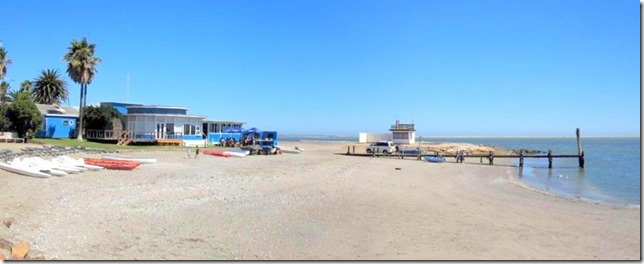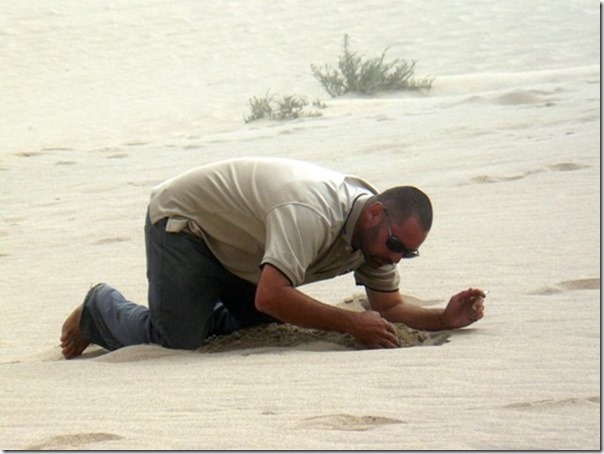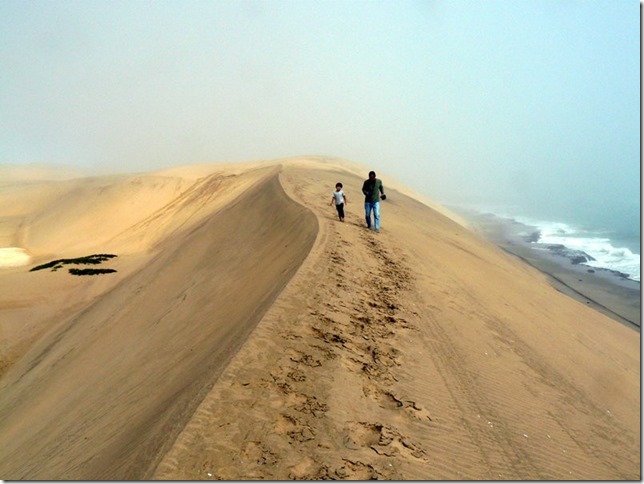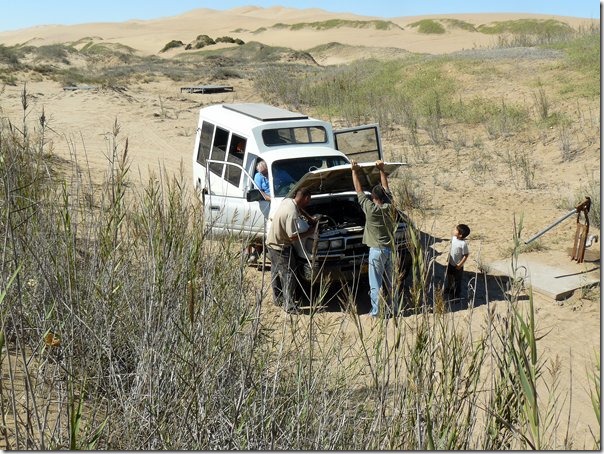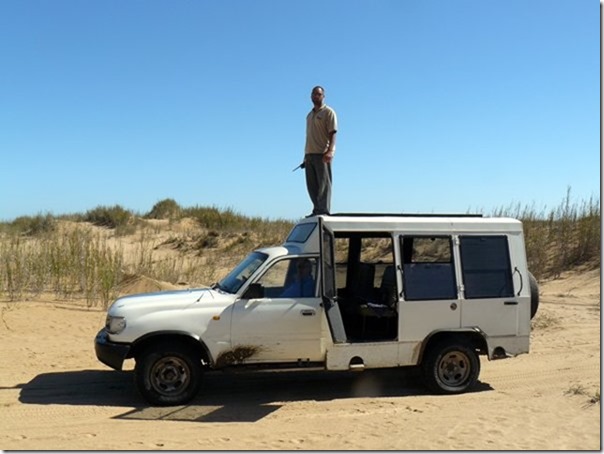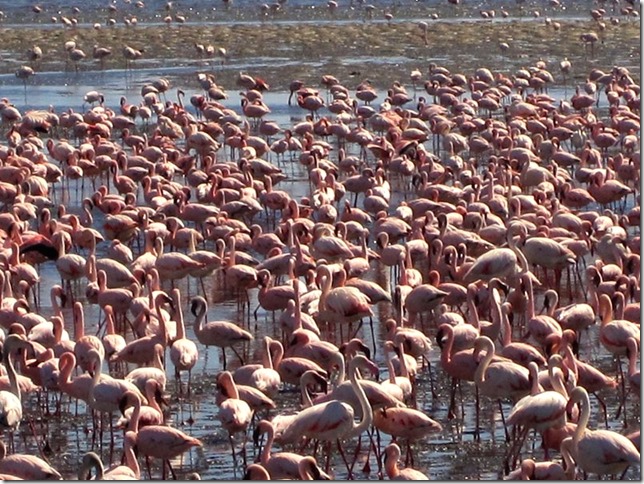Small adventures

JJMoon Diary
Barry and Margaret Wilmshurst
Mon 8 Apr 2013 06:26
|
Walvis Bay Yacht Club 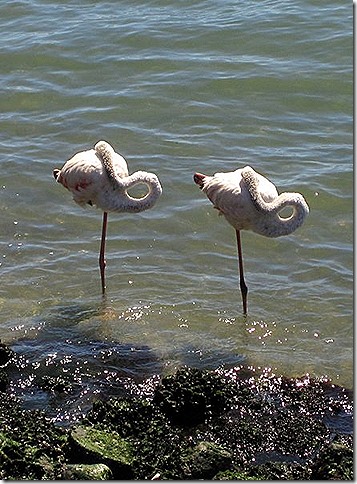 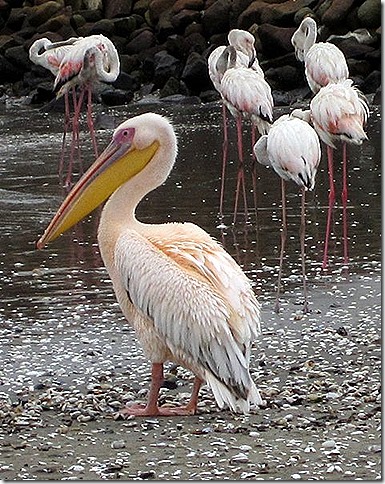 Our friends on the shore Things generally are going pretty well, so far.
The sailmaker has not yet said anything about delaying dispatch beyond
April 10.
Our fellow cruiser with a rigging problem, Fleck, is a boat whose blog we
have been following, quite unbeknown to skipper Richard, for over a year.
While sitting in Rebak, apprehensive about crossing the Indian Ocean, we sought
out the experiences of boats ahead of us. We found Fleck in Cocos, became
hooked on the blog and have been secret followers ever since. 350 miles
SSW of here, on the way to St Helena, Fleck collided with a freighter, scraped
along the side, miraculously avoided major damage but bent a spreader and lost
some gear from the masthead. We read the blog, as usual, and offered to
deliver spare parts to St Helena. The wonders of modern communications have
enabled Richard to order while on the move spares from Allspars in Plymouth, a
company we know well, and arrange for them to be sent to JJ Moon c/o the Walvis
Bay Yacht Club. UPS tracking is forecasting delivery on Tuesday. If
it all works out it will be very satisfactory, even for us. It feels good
to be useful.
There has been a slight hold-up in getting the Yamaha’s water pump impeller
from Tokyo but we should get the motor back on Tuesday. According to
Skeleton Coast Marine’s boss Floosie our motor was specially designed to be
wrapped up in a “rubber duck” and dropped into the sea to enable “special
forces” to storm beaches or infiltrate behind enemy lines. It all seems a
bit far-fetched but Floosie is in earnest and I am not inclined to query the
story; he has been very helpful in searching for a 10 mm chain hook. There
are none in Namibia and the last one in South Africa was sold under Floosie’s
metaphorical nose while he was on the telephone to his supplier. Gone to
another yachtie.
We need the chain hook because we lost the last one while dragging our
anchor on Thursday night. The wind went round to the north-west and a very
nasty short chop rolled into the harbour under a blanket of fog. We jerked
and tugged at our chain and had to lash the wheel to prevent the rudder slamming
against its stops. The jerking tore the hook out of its 10 year old splice
at the end of the snubber. We made repeated forays to the cockpit to check
our position but at 0400 the anchor alarm went off; we were on the move.
There was no danger of ship-wreck, had we not been woken up we should have
grounded in soft mud, but it was chilly in the fog with nothing much on
and difficult to avoid anchored boats. We managed to identify a safe spot
and re-anchored in very poor visibility, with more chain out. The
following morning we picked up a mooring. We are usually very cautious of
moorings, preferring our own ground tackle, but this one is said to be designed
for 30 tonnes and we gave ourselves a break. Knowledgeable salts will
point out that we don’t need the hook, we can secure the snubber to the chain
with a rolling hitch. We shall, but it’s less convenient.
Our enforced stay persuaded the mate to insist that we see more of the
country. Three days’ car hire and another visit to Swakopmund were not
enough. So we signed up for an expedition over the dunes to Sandwich
Harbour. Until the early nineteen-twenties Sandwich Harbour was the
largest European settlement in Namibia. It was a fishing and whaling
centre with a canning factory and considerable infrastructure but the river
silted up, the dunes closed in and everybody decamped to the upstart villages of
Walvis Bay and Swakopmund. There is not much there now; the harbour and a
vast surrounding area have been designated the Namib Naukluft National
Park. Jens was our driver and we shared the
specially adapted Toyota Land Cruiser with a delightful Japanese family with two
small children. Jens is a good driver and well versed in the ways of the
desert. He needed to be because as well as the usual hazards the tracks
had many water-logged patches. Namibia enjoys an average rainfall of 10 mm
a year but 10 days ago it rained all day and put down enough for four
years. It was very difficult to make out firm ground through large
puddles, across the delta and over the salt flats. But we kept going and
had a good many things of interest pointed out to us. After a couple of
hours driving we made a rendezvous with Uncle John and his party of four Chinese
people travelling with the same tour company. A curious incident occurred
over lunch. As we stretched our legs, smiled all round and enquired where
we all came from the Chinese declined the overtures of our Japanese friend and
refused to acknowledge him. After the excellent nibbles had been cleared
away and the women in our party were exploring the backs of nearby dunes the
three men got to chatting. “The first thing I said to Uncle John,” said
Jens, “when I saw his party, was: ‘I bet they don’t talk to each other’”.
Our Japanese father looked grave. “In the Second World War Japan occupied
China. They are very angry. We have to learn about it when we are
young; in school”. I nodded wisely. Coincidentally, I am reading
“All Hell Let Loose”, Max Hastings’s history of the war (a terrific book –
revealing, moving, myth-exploding, lacking in national delusion, difficult to
put down) and I considered myself something of an expert on these matters.
As many as 15 million Chinese people died as a direct or indirect result of the
Japanese invasion. At about the same time up to 25 million Russians died
because of German aggression. The numbers are staggering, difficult to
comprehend but they put our own losses and hardships into perspective. It
all happened over 70 years ago, yet here was a group of mainly youngish people
in the Namibian desert, sipping a cool glass of South African white, with the
sins of the fathers still weighing heavily with them.
Jens looking for geckos
Big sand We set off back, surging up dunes, tipping forward and motoring
precariously down crazy slopes, stopping to look at a human skeleton lying on
top of the sand, at least 200 years old, searching for geckos and learning about
the life-preserving properties of some plants. We nearly had to put the
knowledge to vital use. We stopped at the water pump to learn that good
drinking water was only a metre below the surface, and our engine refused to
re-start. We checked terminals, looked for loose connections and fiddled
with I know not what. We kept calm. Jens walked up a small dune to
call Uncle John on the vhf radio. “If we can’t reach him, we’re
b******d”. We couldn’t reach him. We fiddled again, kept calm, and
had three goes at a push start. She nearly fired, but not quite.
Jens climbed on to the top of the vehicle to call anybody he knew who might be
in the area. No response at first; we kept calm; but then, finally a
strong signal. A vehicle from another tour company was close-by.
More investigation and hammering the starter motor did no good but a tow rope
was connected and we were given a pull start. Jens said he had taken an
“executive decision” to return by the most direct route. Did we
mind? We said we didn’t mind. So he kept the revs up and we raced
back to Walvis Bay along the flattish sand close to the shore line. The
engine fluttered as we slowed for each tricky bit and Jens struggled to engage
the right gear. The exhaust over-heated and there was a smell of burning
rubber. But we were delivered safely back to the yacht club and over a
cooling glass of something restorative reckoned we had had a good day.
1. What’s wrong? 2. Is anybody out there? Earlier in the day we had visited our favourite garage and filled our last
three cans of diesel. We think it might have been possible to have fuel
delivered alongside in the small boat harbour but nobody was very sure and
finding ourselves with a hire car for three days and the facility to drive right
down to the beach alongside the dinghy, we decided to do it with cans. We
filled, transported across a half-mile stretch of often choppy water, hauled up
on deck and emptied 18 five-gallon cans. We felt well satisfied when we
had finished. One fewer thing to worry about.
We reckon we shall be here for another week at least. But it‘s a good
spot. Everybody seems to agree, natives and visitors alike, that Namibia
is making great strides, there is less tension than in neighbouring countries;
less need for ugly security measures. Provided our plans are not
frustrated further we shall enjoy our remaining stay.
Crowded beach |
